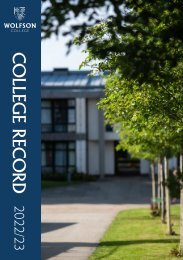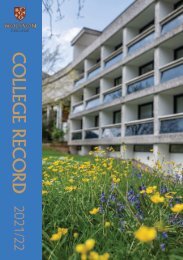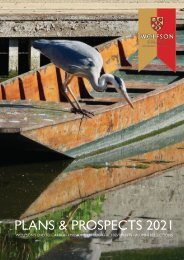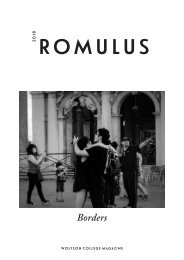You also want an ePaper? Increase the reach of your titles
YUMPU automatically turns print PDFs into web optimized ePapers that Google loves.
example, by organising, with Jerome Bruner,<br />
a seminar that brought together graduate<br />
students in philosophy, like Hardy and myself,<br />
with graduate students in psychology like<br />
Andrew Meltzoff. Berlin also began friendships<br />
with other graduate students who played<br />
important parts in Hardy’s endeavours, notably<br />
Roger Hausheer and Aileen Kelly. Hardy sums<br />
up Berlin’s egalitarianism when he comments<br />
that ‘despite the large differences in age and<br />
status between us, he never pulled rank, and<br />
mostly treated my enquiries and suggestions<br />
and disagreements as if they were those of an<br />
intellectual equal.’<br />
The first part of the book, chapters 2 to 8, tells<br />
the story of how Hardy coaxed Berlin to agree<br />
to the republication of large numbers of his<br />
essays and lectures, at first into four volumes<br />
of his Selected Writings, and later into several<br />
more. This was no easy task, working against<br />
Berlin’s almost pathological self-depreciation<br />
and fear of adverse criticism, as well as his<br />
alarming tendency to change his mind and<br />
go back on previous agreements. The most<br />
outrageous example of this was in 1976 when<br />
he suddenly withdrew his approval of the<br />
volume containing his philosophical essays.<br />
Hardy eventually managed to persuade him to<br />
rescind his veto, so that most, but not all, of the<br />
essays were republished.<br />
After a rebuff like this, it is not surprising that<br />
Hardy did his best to avoid a recurrence.<br />
Even so, Hardy’s chutzpah on occasions<br />
is breathtaking, for example when he<br />
commissioned Noel Annan to write an<br />
introduction to the volume of Personal<br />
Impressions, without telling Berlin, still less<br />
asking permission from him.<br />
The second half of the book, chapters 9 to<br />
11, is about that aspect of the voluminous<br />
correspondence between Hardy and Berlin<br />
in which Hardy probed Berlin’s ideas and<br />
sought, not always successfully, to give them<br />
greater clarity. I am particularly interested<br />
in the chapter on Pluralism and Religion,<br />
having spent a good deal of my working life<br />
inspecting independent religious schools for<br />
the Department of Education (and Science)<br />
as a representative of an ostensibly pluralist<br />
state, seeking to persuade Jewish, Muslim<br />
and Evangelical Christian proprietors to<br />
espouse a more liberal approach without<br />
abandoning their deeply-held beliefs. As<br />
the laws governing independent schools<br />
tightened up, it was no longer just a matter<br />
of persuasion: schools, rather paradoxically,<br />
can now be compelled to be liberal. A<br />
definition of ‘Fundamental British Values’ first<br />
surfaced in the Prevent strategy and was<br />
then incorporated into secondary legislation<br />
in the Independent School Regulations<br />
which specify that proprietors must actively<br />
promote ‘the fundamental British values of<br />
democracy, the rule of law, individual liberty,<br />
and mutual respect and tolerance of those<br />
with different faiths and beliefs.’ While there<br />
is nothing exclusively British about these<br />
values, they are undoubtedly liberal.<br />
For understandable biographical reasons,<br />
Hardy’s view of religious adherence is rather<br />
narrow. He writes as if people join a religion<br />
by giving intellectual assent to a series of<br />
theological propositions, and are then bound<br />
to accept all the logical consequences of<br />
these propositions. While Berlin avows that<br />
he is tone-deaf to religious sentiment, his<br />
understanding of religion is much broader:<br />
even if religion may be theologically empty, it<br />
is anthropologically of great significance.<br />
In a book peppered with accounts of<br />
Berlin forgetting events and conversations<br />
completely, and even denying that he<br />
had ever written essays and lectures that<br />
Hardy brought to light, I feel myself in<br />
good company when I say that I have no<br />
recollection whatsoever of the conversation<br />
with me that Hardy reports (pp. 48 and 49),<br />
though I remain flattered that he thought<br />
my opinion might cut some ice with Berlin.<br />
THE RECORD<br />
WOLFSON.OX.AC.UK<br />
93
















